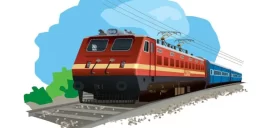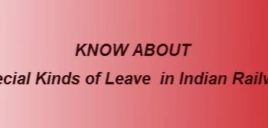2.1.0 Introduction to Organisation of Indian Railways :
- The Indian Railways’ net work is owned and managed by the Central Govt. All the operations are controlled and directed by the Railway Board under the overall supervision of the Minister of Railways.
- The net-work of Railways is divided into nine Zonal Railways each under the control of a General Manager.
- Each Railway zone is organized on the divisional pattern of working.
- In addition there are six modern Production Units
- Chittaranjan Locomotive Works at Chittaranjan,
- Integral Coach Factory at Parambur at Madras,
- Diesel Locomotive Works at Varanasi,
- Wheel & Axle Plant at Bangalore,
- Diesel Component Works at Patiala and
- Rail Coach factory at Kapurthala.
- On a Zonal Railway, General manager is assisted by Additional General managers and heads of different departments such as Chief Engineer, Chief Optg. Supdt., Chief Comml. Supdt, Chief Mech. Engineer, Controller of Stores etc.
In Railway Board, Member (Mechanical) looks after the material management function who has one full time Additional Member( Railway Stores) to assist him. Additional Member( Railway Stores) is the head of Railway Stores Directorate.
There are
- Executive Directors,
- Directors
- Joint Directors and
- Deputy Directors in this Directorate.
The functions of Railway Stores Directorate in Railway Board are summarized below:-
(a) Providing policy frame work: Framing policies for efficient materials management on Railways and issue of policy directives to all Zonal Railways and production units on stores and purchase matters coordinate various activities of materials management.
(b) Inventory Control :- Railway Board evolve policies for efficient inventory management of Indian Railways. For this integrated materials budget is processed by this Directorate. They also monitor inventory performance of Railways and production units by getting periodic returns from the Railways and issue directives from time to time.
(c) Centralized Purchase :- Railway Stores Directorate is also doing field function of purchases. Some of the items of Railways are centralized for purchase through Railway Board only. Some of these items are listed as under
(i) Complete units of Rolling Stock,
(ii) Importation of Wheel Tyres & Axles (WTA),
(iii) Selected critical items for which capacity is either equal to or less than Railways demands.
- These items are centralized for purchase through Railway Board to ensure equitable distribution as per needs of Railways. Some of these items are train lighting batteries, train lighting lamps, central buffer couplers, some rubber products, special steel items, petrol, lubricants and oils (POL),
Textiles items.
(iv) Processing of all cases which are initiated by Zonal Railways but the purchases against the same is beyond the competence of General Managers (For Purchases more than Rs. 8 crores / item as per Rly. Bd. letter dated 03-09-97).
(d) Liaison with other Ministries in case of purchases done through Directorate General of Supplies and Disposals and in cases of imports when clearance from Ministry of Industry & Chief Controller of Imports & Exports is required .
- To maintain good liaison with DGS&D and other Ministries, Railway Stores Directorate have posted one JA/SS Grade officer in DGS&D who is designated as Railway Liaison Officer.
(e) Coordinate for supply of steel from main producers to various Railways and production Units . For this purpose Railway Stores Directorate have one Director at Calcutta who is participating in various meetings of Joint Plant Committee for drawing Rolling program and also reviews supply position of steel to various Railways and Production Units. Director (Iron & Steel), Calcutta is also coordinating for planning and supply of steel to various wagon builders.
2.1.2 Materials Management Organization in Zonal Railways : In Railways an integrated concept of Materials Management is already existing. All Zonal Railways and Production Units have got separate department known as `Stores Department’ for performing all the functions related to materials management. The head of Stores Department is known as Controller of Stores who functions at the same level as other Heads of departments.
The Zonal Railway organization of stores Department is at three levels ;
- Headquarters level
- Divisional level and
- Extra Divisional or District level in the form of Stores Depots and PrintingPresses.
a. Organization at Head-quarter level :- At headquarters level, office of Controller of Stores is responsible for both coordinating various activities of stores depots and divisional controller of stores and also purchases.
o All purchases on Indian Railways are centralized in COS office only except for items of petty value. For discharging these duties COS is assisted by few Chief Materials Managers who are in S.A. Grade, Dy. Controller of Stores who are in Junior Administrative or Selection Grade, Sr. Stores Officer in Sr. Scale and Asst. Controller of Stores in Assistant Grade.
o Some of the officers are looking after functions of Inventory Control and disposal of scrap also in addition to purchase.
o Office of Controller of Stores is organized in various purchase sections. But there are some non purchase sections also such as Tender Section, General Section, Inventory Control Section, Firm’s Registration Section, etc.
b. Organization at Divisional level :- Divisions have a Sr. Div. Controller of Stores or Div. Controller of Stores who is to coordinate with Controller of Stores to meet the material requirements of his Division. He has been delegated some purchase powers also to locally Purchase items required for his Division. Divisional Stores Depots are also being planned for many of the Divisions.
c. Organization at Depot level :- The problems on Railways are more complex than those of a manufacturing organizations. There are thousands of indentors spread over a large geographical area. The Railways therefore, have to plan locations of the various stores depots with care.
- Normally Stores Depots are located attached to the major workshops and are known as attached depots. In addition, Stores depots for materials of general nature which are required by most of the indentors are situated at one or two convenient locations from where the supplies can be effected. These are called as General Stores Depots.
- Stores Depots are generally under the supervision of Gazetted officers of the Stores Department referred to as Depot Officers. A Depot Officer may be in Selection Grade/JA Grade or Senior Scale or even Jr. Scale.
- The Depot Officer is responsible to the Controller of Stores for the efficient maintenance of stocks of stores and for the prompt service to the indenters in his territory. The depot officer is assisted in his work by Asst. Depot Officers and other Senior Staff such as Depot Store Keepers (DSKs).
The work in a Stores Depot consists of ;
(i) Receipt and inspection of stores
(ii) Storage and issue of materials
(iii) Dispatch of materials
(iv) Disposal of surplus stores and scrap materials
For facility of work, there should ordinarily be ;
- A locomotive depot attached to and serving the main loco workshop
- C & W stores depot attached to C & W Shops
- Signal Stores Depot attached to Signal Shops
- Electrical Stores Depot attached to Elect. Shops
- Permanent Way Depots for stocking Permanent Way & Bridge material
- Stationery Depot
- Scrap Yards
- General Stores Depot
- Electric Loco Stores Depot attached to an Electric Loco Shed
- Diesel Loco Stores Depot attached to a Diesel Loco Shed
- Printing Stores Depot attached to Rly. Printing press
d. Printing Press : Requirement of forms, books, time-tables, all type of tickets like card tickets, platform tickets, coupons etc., is met by Railway Printing Presses. These process are under the Supervision of Suptd. of Printing and Stationery.
BACK TO TOPICS
2.2.0 Functions of Stores Department : Functions of Stores Department can be classified as under ;
(a) Material Planning :- This consists of ascertaining the need of the various departments in the matter of materials and stores and devising such policies that all the materials which have constant demand and also some critical non-wearing materials are constantly available so that they are supplied to the user departments without delay. This includes classification / categorization of items, codification, designing of recoupment policies, taking `make or buy’ decision and also preparation of stores budget.
(b) Procurement of Stores :- This includes purchase of materials of required quality and quantity at reasonable prices. On Indian Railways we purchased materials worth about Rs. 6488 crores in 1995-96.
o This activity also includes development of sources of supply with due emphasis to development of ancillary industries, small scale industries and indigenous sources for imported items (import substitution). This also includes, maintaining constant touch with the market to ensure steady flow of materials.
(c) Receipt & Inspection of Stores :- This includes taking delivery of materials from carrier, checking of quantity and quality and their accountal.
(d) Store Keeping :- This includes stocking of materials in the wards, their handling, issuing on demand by indentors and maintaining proper records.
(e) Distribution of Stores :- This includes timely dispatch and distribution of materials to various users by adopting quick and right mode of transportation.
(f) Collection, accountal and disposal of scrap :- This activity is main revenue earning activity of
Stores Department these days. On Indian Railway, sale of scrap is of the order of Rs.1000 crores.
(g ) Inventory Control :- This includes maintaining an economic level of investment in inventories coupled with fulfilling user’s requirements of materials satisfactorily.
(h) Cost Reduction :- As already explained in Chapter 1, Materials. Management Department can contribute a lot on cost reduction. Some of the techniques used for this purpose are ;
1) Variety Reduction
2) Standardization
3) Value Analysis
4) Forecasting.
2.3.0 Some relevant information (year 1996-97) :
Total Expenditure on Purchase (for manufacturing of Rolling Stock, for Fuel, for Construction, for Operations, Repairs and Maintenance ) : Rs. 852 crores
Inventory Position (without fuel)
Inventory Balance : 545 crores
Total Issues : 4565 crores
Turn-over-Ratio : 12 %
Total number of depots : 215
(out of which 105 depots are having issues over Rs.5 crores )
Total number of Printing Presses :
- 11 General Printing Presses and
- 11 for Printing Tickets only
Disposal of scrap :
- Rs. 853 crores (96-97)
- Rs.1018 crores (95-96)
Staff : (96-97)
Gazetted : (group A & B) 685 nos.
Group “C” 18,159 nos.
Group “D” 17,735 nos.
Total 36,579 nos.










